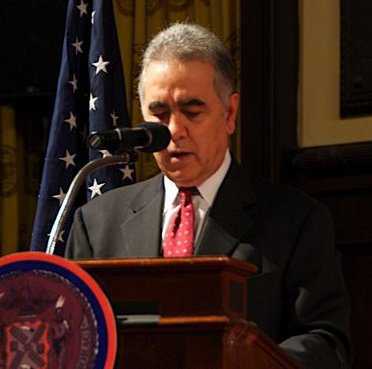By Harut Sassounian
Publisher, The California Courier

In recent years, Armenian-Americans have filed several lawsuits in U.S. courts against insurance companies, banks, and the Republic of Turkey, seeking compensation for losses stemming from the Genocide of 1915.
For the first time, on September 15, the European Court of Human Rights (ECHR) will hold a hearing on a complaint filed by an Armenian family against the Republic of Azerbaijan for damages suffered during the Karabagh (Artsakh) conflict. Remarkably, the ECHR will consider on the same day a similar complaint brought by several Azeris against the Republic of Armenia (Chiragov and others vs. Armenia).
Minas Sargsyan, a former resident of Gulistan in the Shahumyan region, north of Artsakh, filed a complaint on August 11, 2006, regarding the destruction of his house and eviction from his property. Sargsyan stated in his complaint that someone else, presumably an Azeri, is now living in his house. Although Sargsyan passed away a year ago, his widow and two children are continuing to pursue the case. Due to a backlog, the ECHR normally takes several years before it hears a case. The Sargsyan family is represented before the Court by attorneys Narine Gasparyan and Knarik Ohanyan of Yerevan (members of the Legal Guide NGO), and well known human rights lawyer Prof. Philip Leach representing the European Human Rights Advocacy Center in London.
The Shahumyan region is situated on the northern border of the former Nagorno-Karabagh Autonomous Oblast, as it was known in Soviet times. More than 80% of Shahumyan was inhabited by Armenians prior to the Artsakh conflict. In June 1992, when the Azerbaijani forces bombed Gulistan, Sargsyans’ two-storey house was destroyed. As a result, the entire population of the village fled fearing for their lives, according to the “Statement of Facts,” summarized by the ECHR.
Sargsyan’s complaint is based on the following claims:
1. The destruction of his house and eviction from his property constituted “a violation of his right to peaceful enjoyment of his possessions.”
2. Infringement on his right to a private and family life and to his home because of his forced displacement and Azerbaijan’s continuing refusal to allow him access to his home and belongings.
3. In view of the demolition or vandalism of several Armenian cemeteries in Azerbaijan, Sargsyan stated that he was unaware of the condition of the cemetery of his close relatives and that he was deprived of the possibility of visiting their graves, which he had done regularly in the past. The mere fact of knowing that the graves of his relatives were under the risk of being destroyed caused Sargsyan severe suffering and distress. The inability to visit the cemetery deprived him of spiritual communication with his deceased relatives, as visiting and maintaining his relatives’ graves was a religious duty that he fulfilled before his eviction.
4. There are no effective remedies available to ethnic Armenians who were forced to leave their homes in Azerbaijan. Armenians who had sought to lodge complaints with relevant Azerbaijani authorities were unable to obtain any redress for the violation of their rights. Due to the unresolved status of the Artsakh conflict, there were practical difficulties and obstacles for gaining direct access to any remedies available in Azerbaijan.
5. Sargsyan complained that he had been subjected to discrimination in Azerbaijan, based on his ethnic and religious affiliation. He submitted that only ethnic Armenians living in Azerbaijan had been targets of violence, pogroms, and attacks. The Government of Azerbaijan failed to investigate violence against Armenians and to provide redress for the illegal occupation of their properties and the destruction of Armenian cemeteries.
This is the first Armenian complaint lodged with the ECHR for violations of property rights, among others, by the Republic of Azerbaijan. If successful, it will set an important precedent for claims by hundreds of thousands of Armenians who were forced to abandon their properties in Baku and other parts of Azerbaijan. Similarly, the Chiragov complaint lodged against Armenia could open the door for demands by hundreds of thousands of Azeris who left their homes during the Artsakh conflict. In contrast to the Armenian case, however, most Azeris left at their own free will and sold their properties prior to their departure.
It cannot be a mere coincidence that the Armenian and Azeri complaints are set to be heard by the Grand Chamber of the ECHR on the same day. If the Court finds a violation of property rights in these two cases, and orders monetary compensation to the applicants, this would likely lead to many similar cases being filed in the future, which could have far-reaching consequences for the economies of Armenia and Azerbaijan, amounting to billions of dollars. Alternatively, the Court could mandate that both countries allow their respective citizens to return to their former homes, which could create new upheavals and security risks in the region. As members of the Council of Europe, Armenia and Azerbaijan are obligated to comply with the decision of the Court.
Both hearings could be followed live on September 15, on the Court’s website: www.echr.coe.int/echr. The Azeri complaint will be broadcast at 9:15 a.m., while the Armenian one is set for 2:30 p.m. (French time).
